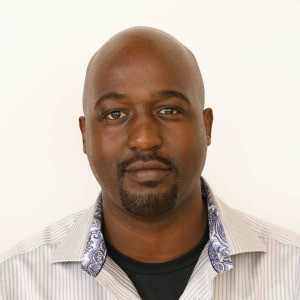
Andrew Mude

Andrew Mude working with rural children
Media Resources:
Press Release
For hi-res photos, right-click on images above
Andrew Mude
Kenya
Andrew Mude, a senior economist at the International Livestock Research Institute (ILRI) in Nairobi, Kenya, was named the 2016 recipient of the “Norman Borlaug Award for Field Research and Application, Endowed by the Rockefeller Foundation.” The announcement of his selection was made by Ambassador Kenneth Quinn, President of the World Food Prize Foundation, at ILRI on August 30. “Dr. Mude reflects Borlaug-like persistence in his science-based, community mediated, and innovative approach to providing financial protection, through insurance, to millions of poor herders and their families who care for and depend upon their livestock as they move across the vast rangelands of East Africa,” Quinn said.
Born in Kenya in 1977, Mude has spent years developing and leading a program in Kenya and Ethiopia that provides insurance for never-before-insured communities that depend upon herding cattle, goats, sheep, and camels in the remote, arid and drought-prone lowlands of the Horn of Africa. These vulnerable pastoralists can now more quickly recover from severe to catastrophic droughts, which account for 75 percent of livestock deaths in the Horn and have perennially left these communities destitute.
The research-into-development program that Mude spearheaded is titled “Index-Based Livestock Insurance (IBLI).” Like Dr. Norman Borlaug’s pioneering work, IBLI combines scientific research, policy, community outreach and education—all with a willingness to embrace unconventional solutions. This comprehensive approach was launched in 2008 by Mude and his team at ILRI, who were joined by colleagues from Cornell University and the U.S. Agency for International Development BASIS Collaborative Research Support Program.
Early on, Mude was encouraged by an innovation in the insurance industry that uses an index—such as a measure of rainfall—to trigger an insurance payout instead of requiring hard evidence of individual damage. Mude saw an opportunity to measure the state of grazing conditions in a given region and use that as a proxy, or index, for the health of livestock.
Tailored to meet the risk profile of the pastoral production system, the IBLI agenda is uncommonly comprehensive, encapsulating elements of product development and design that require extensive survey work and interactions with the target communities. The key to this system is the use of satellite data to monitor grazing conditions. When conditions fall below a certain threshold, this data serves as a proxy for dead animals—and insurance payouts are made.
With 40 percent of the livestock production in Kenya and Ethiopia generated by herders, pastoralism is very important to the national economies of both countries. Mude and his colleagues worked with local herders and leaders in building and delivering extension and capacity building programs, including distribution of diverse educational material, to help them understand the principles and benefits of the IBLI insurance plans available. They learned, for example, that one could pay premiums for several seasons and not get a payout if grazing conditions remained relatively healthy.
Mude’s goal is to continue improving IBLI and to introduce complementary innovations to support improved pastoralist resilience. He is working to implement the supplementation of satellite images of rangelands by having herders regularly submit pictures of their grazing lands, which, combined with the satellite imagery, would give a “real-time,” constantly updated depiction of rangeland health.
Like Borlaug, Mude passionately believes that much can be done by working directly for, and with, the billion-plus food producers of poor countries. A Kenyan city-boy, schooled abroad, who has relatives still practicing livestock livelihoods in Marasbit District (coincidentally the first target of his livestock insurance pilot), has most assuredly taken Borlaug’s exhortation “take it to the farmer” to heart, and even a step further: “take it to the remote livestock herder.”


